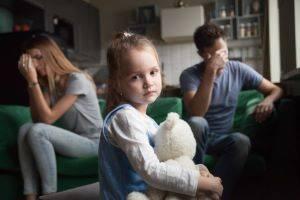4 Common Myths About Divorce and Children
 Divorce can be extremely hard on the children involved. That is certainly not a myth. However, there are other myths surrounding divorce and children that are not true, and parents going through the divorce process should be prepared to address concerns about how their children will be affected. Four of these myths, and the truth behind them, are outlined below:
Divorce can be extremely hard on the children involved. That is certainly not a myth. However, there are other myths surrounding divorce and children that are not true, and parents going through the divorce process should be prepared to address concerns about how their children will be affected. Four of these myths, and the truth behind them, are outlined below:
Divorce Is Easier for Younger Children
Divorce is not easy for any child, but some people believe that the younger a child is, the easier the divorce process will be for him or her. This myth seems to stem from the belief that when a child is a toddler, he or she is unable to form sufficient memories, and if a child cannot properly remember a divorce, it cannot cause as much trauma. Unfortunately, this is not true. Fighting and tension between parents can be extremely difficult things for a toddler to deal with, and these conflicts can impact a child's development. As such, it is important for parents to try to address divorce disputes as amicably as possible when children are involved, regardless of how old those children are.
Each Parent Should Have the Same Rules After Divorce
It is natural for parents to have different approaches to raising their children, both when they are married and after getting divorced. Following divorce, parents often believe that they will need to impose the same rules in each household, but that is not true. Different rules in different households will not harm the mental or emotional health of a child, and in fact, those differences can help the child become more adaptable and learn how to be flexible in different situations.
Parents Should Protect Their Children From Their Divorce
It is true that parents should try to make the divorce as easy as possible for the children involved. However, this does not mean that they should try to sugarcoat things or try to keep the divorce secret for as long as possible. This can do much more harm than good. Children will feel the tension between parents and know that things are changing, even if parents do not tell them directly. When you are not honest about what is going on, your children will struggle with uncertainty about how their lives may change and what life will look like after your divorce is final. If you do not answer children's questions honestly, they may come up with answers on their own that are neither accurate nor helpful.
Children Only Suffer Emotionally
It is true that children will feel many emotions when their parents get divorced, and they may struggle to address the stress and anxiety they experience. However, children of divorce can also go through many physical changes that can be just as alarming. These can include weight loss, a compromised immune system, and insomnia, to name just a few. If you notice any signs of physical distress, you should consult your child's pediatrician.
Contact an Arlington Heights Divorce Lawyer
If you are facing divorce and have children, you will want to do your best to make the process as easy as possible for them. Skilled Palatine family law attorney Nicholas W. Richardson understands the unique concerns that families face during divorce, and he can explain your options and help you reach a settlement that protects your children's best interests. Call our office today at 847.873.6741 to arrange a free consultation and to learn more about how we can help.
Resources:
http://www.ilga.gov/legislation/ilcs/ilcs4.asp?ActID=2086&ChapterID=59&SeqStart=6000000&SeqEnd=8300000
Introducing The Law Office of Nicholas W. Richardson
Nicholas W. Richardson is an experienced divorce lawyer and mediator whose comprehensive legal knowledge, commitment to clients and reputation for results bring lasting solutions to your problems.






